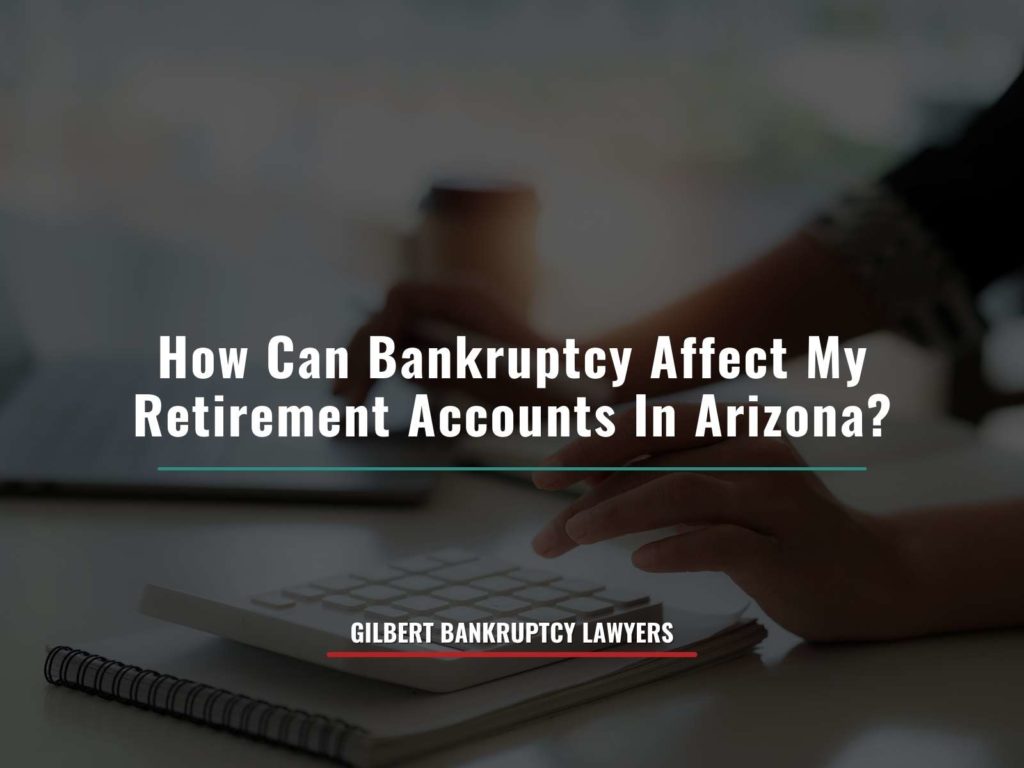Protecting Your Retirement Accounts From Creditor Seizure
If you’re thinking about filing for bankruptcy, you’re probably concerned about what may happen to some of your most valuable assets, such as your retirement accounts. It’s smart to consider all of your options, because while filing for bankruptcy can give you a fresh start, it isn’t necessarily the best choice for everyone and can have significant consequences if you don’t know what to expect.
Arizona state law allows property exemption to federal bankruptcy laws. Property protection is an important part of the new financial beginning that you get from filing for bankruptcy and provides protection for many of your assets. This is especially beneficial for people who file for bankruptcy due to medical bills, a job loss, or other unexpected event.
Arizona’s property exemptions means that the law is on your side when you file for bankruptcy. However, the law is also complex, so it’s imperative to have a dedicated Gilbert bankruptcy attorney with you throughout the process. A skilled attorney will know how to maximize your exemptions and protect assets such as your retirement accounts from creditor seizure.
Federal Bankruptcy Law
When you file for bankruptcy, an automatic stay immediately goes into place and instantly stops a number of actions, including:
- Repossession
- Wage garnishment
- Foreclosure
- Lien placement
- Eviction
- Creditor harassment
- Most court actions against you as related to your finances
Some of these processes, such as eviction, may only be temporary, but the automatic stay can give you some much-needed relief from debt collectors and a bit of time to work through your options, such as finding a new place to live.
Federal bankruptcy laws include a protected repayment period for Gilbert Chapter 13 bankruptcy and an immediate debt discharge in a Gilbert Chapter 7 bankruptcy. If you file for Chapter 13 bankruptcy, you will have 3-5 years to catch up on your mortgage payments and make payments on other debts. Chapter 7 bankruptcy will eliminate almost all credit card, medical bills, and other debt in just a few months.
Arizona’s Bankruptcy Exemption Law
Although the basic bankruptcy provisions are the same in most other states, Arizona is one of just a few states that provides special protection for accounts such as IRAs, 401(k)s, and similar retirement accounts. This exemption is important for people who choose to file for bankruptcy because creditors often go for the easy, large sum of cash that may be available in a retirement account.
Arizona’s state laws also protect 529 college savings accounts, teacher retirement benefits, government pensions, Social Security and VA disability, and other government benefits. Although this protection is good news for people who are forced to file for bankruptcy due to an uncontrollable situation, such as medical debt after a car accident, it has some downsides too. For example, some people move money into retirement accounts right before they file Gilbert Chapter 13 bankruptcy in order to take advantage of this exemption, which is potentially illegal. Other people keep their exemption government benefits in the same account as their wages, which can be garnished. This commingling can make it difficult for the bankruptcy trustee to apply the exemption.
Protection for retirement accounts depends on the individual state laws, so it’s important to consult with your Gilbert bankruptcy lawyer to verify what exemptions apply to your accounts.
Which Type of Bankruptcy Do I Qualify For?
In order to file for Chapter 7 or Chapter 13 bankruptcy, you’ll need to meet certain qualifications. The most significant qualification for Chapter 7 is the “means test.” Your annual household income must be below the average level. This figure changes frequently, but was around $85,000 in Arizona in 2020 for a family of four.
In order to qualify for Chapter 13 bankruptcy, a debt ceiling usually applies. This is designed to prevent people from abusing the system when they actually have the means to pay off their debts. You cannot have more than approximately $1.3 million in secured debts and $400,000 in unsecured debts, including both current and past due financial obligations. Additionally, Chapter 13 debtors must have sufficient monthly income to make the monthly debt consolidation payments that will be determined by the bankruptcy trustee. The exact amount will vary significantly, but is usually about as much as a mortgage payment.
To find out which type of bankruptcy filing you may qualify for, and which may be the best option for your situation, consult with a trusted Gilbert bankruptcy lawyer.
Gain Peace Of Mind With an Experienced Bankruptcy Attorney In Gilbert
If you’re thinking about filing for bankruptcy in Arizona but want to protect your family’s assets and your retirement accounts from creditor seizure, contact the trusted legal team at Gilbert Bankruptcy Lawyers. All of our clients are treated with respect and compassion as we guide you through every step of the process to obtain financial peace of mind. To get started on your new future free of harassment from debt collectors, contact our office today.
Gilbert Bankruptcy Lawyers
Office: 480-448-9800
Email: info@myazlawyers.com
Website: https://gilbertbankruptcylawyers.com
Additional Information at:
Vegas Zero Down Bankruptcy Attorney

